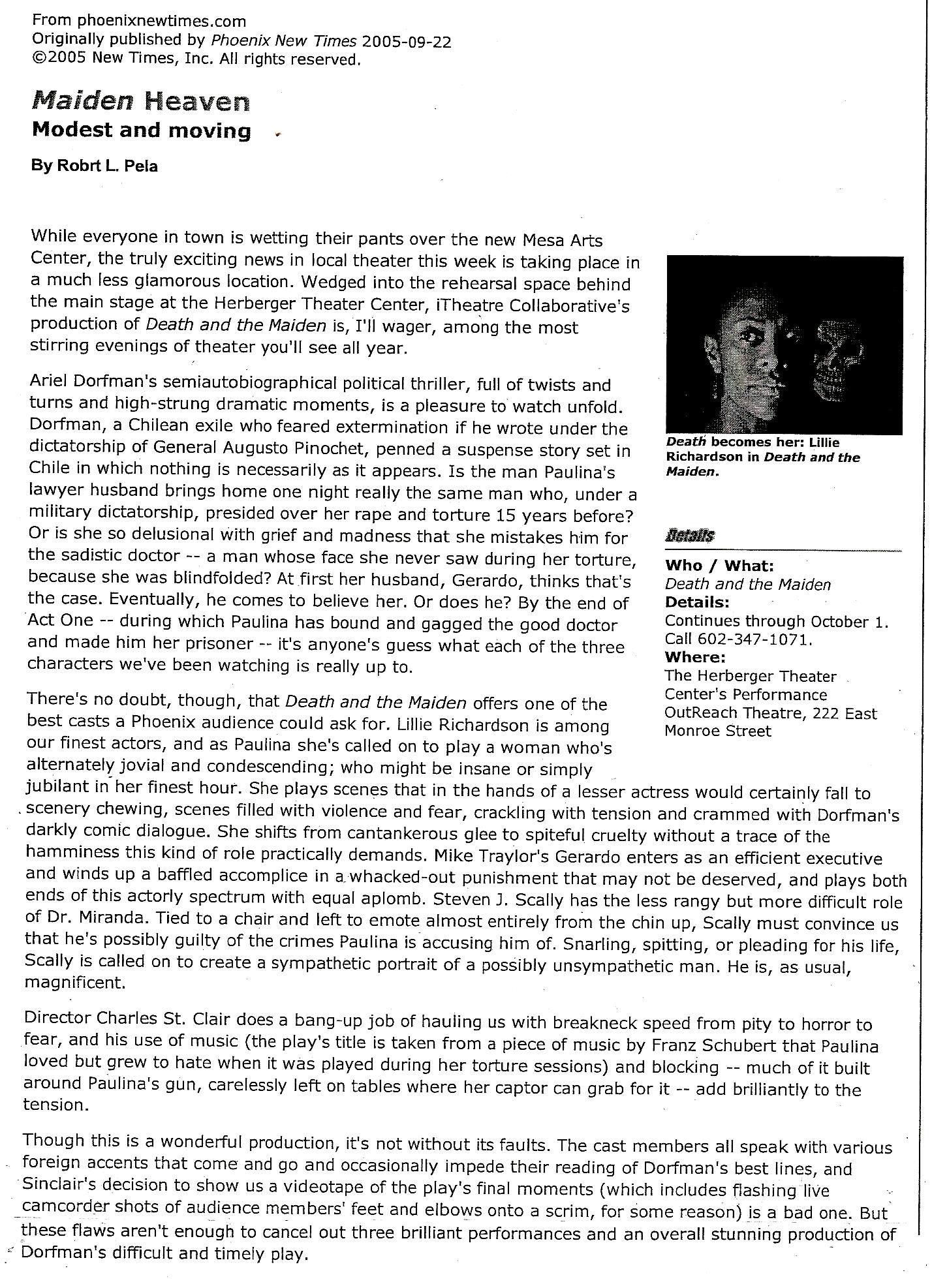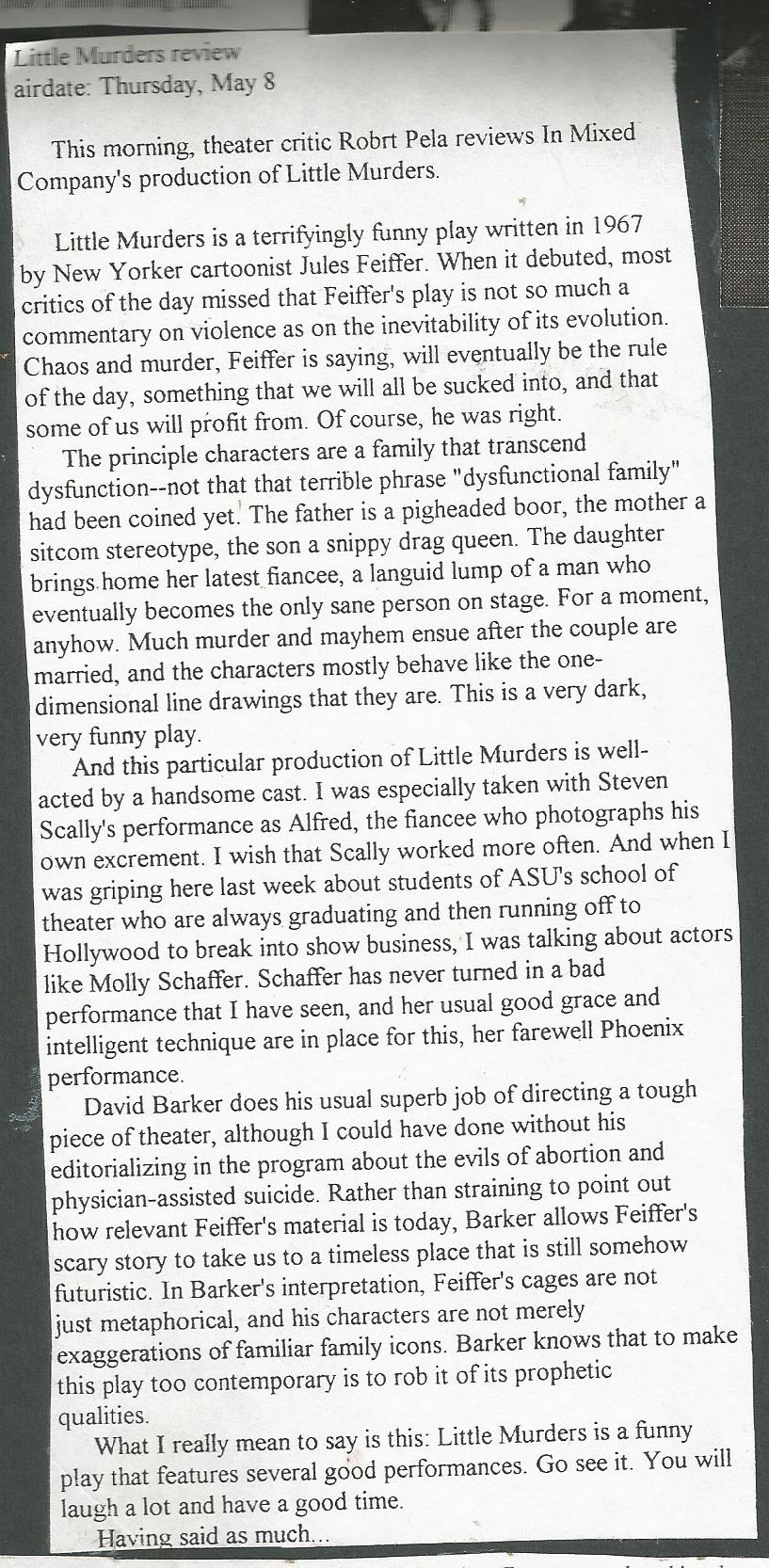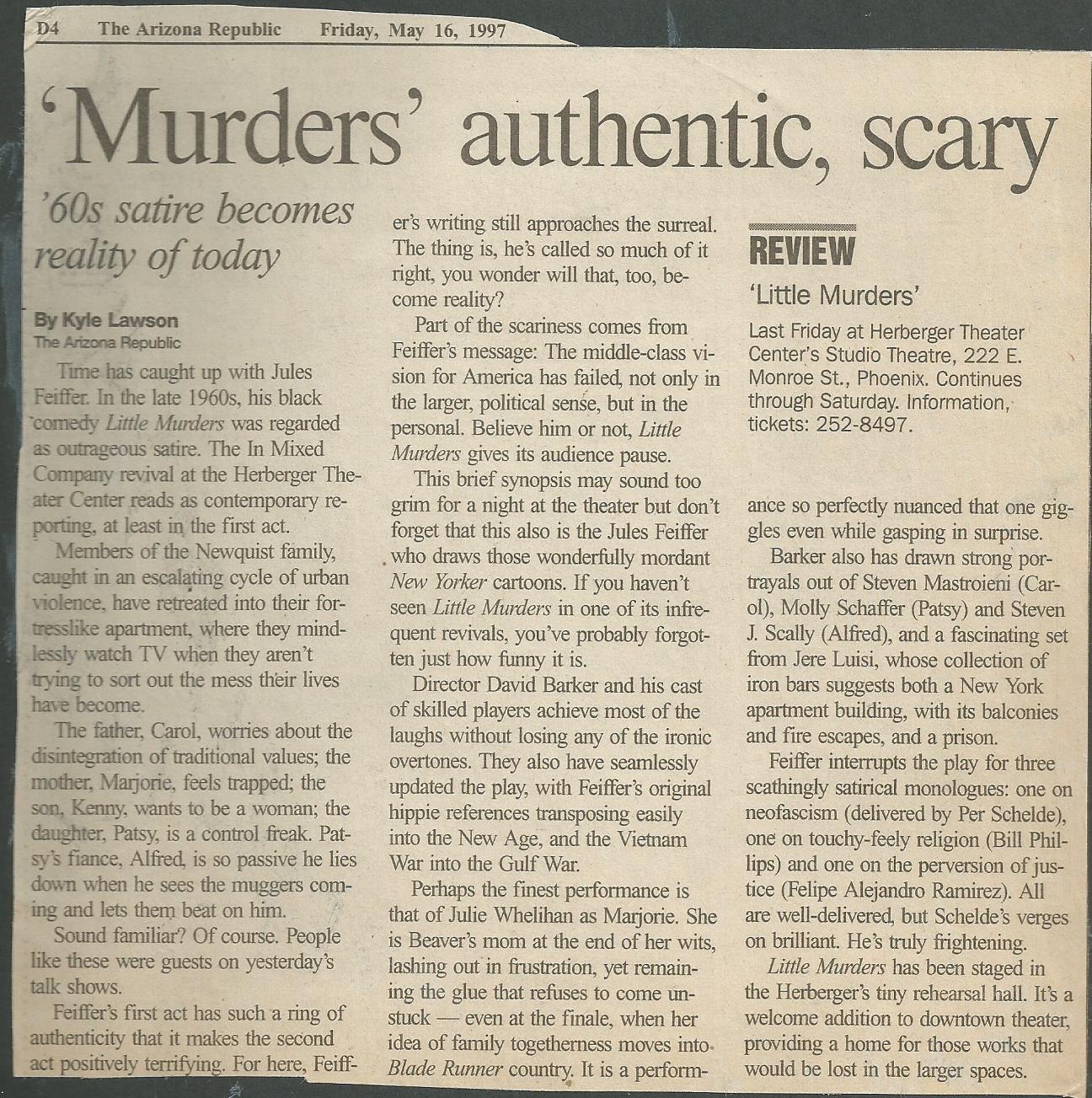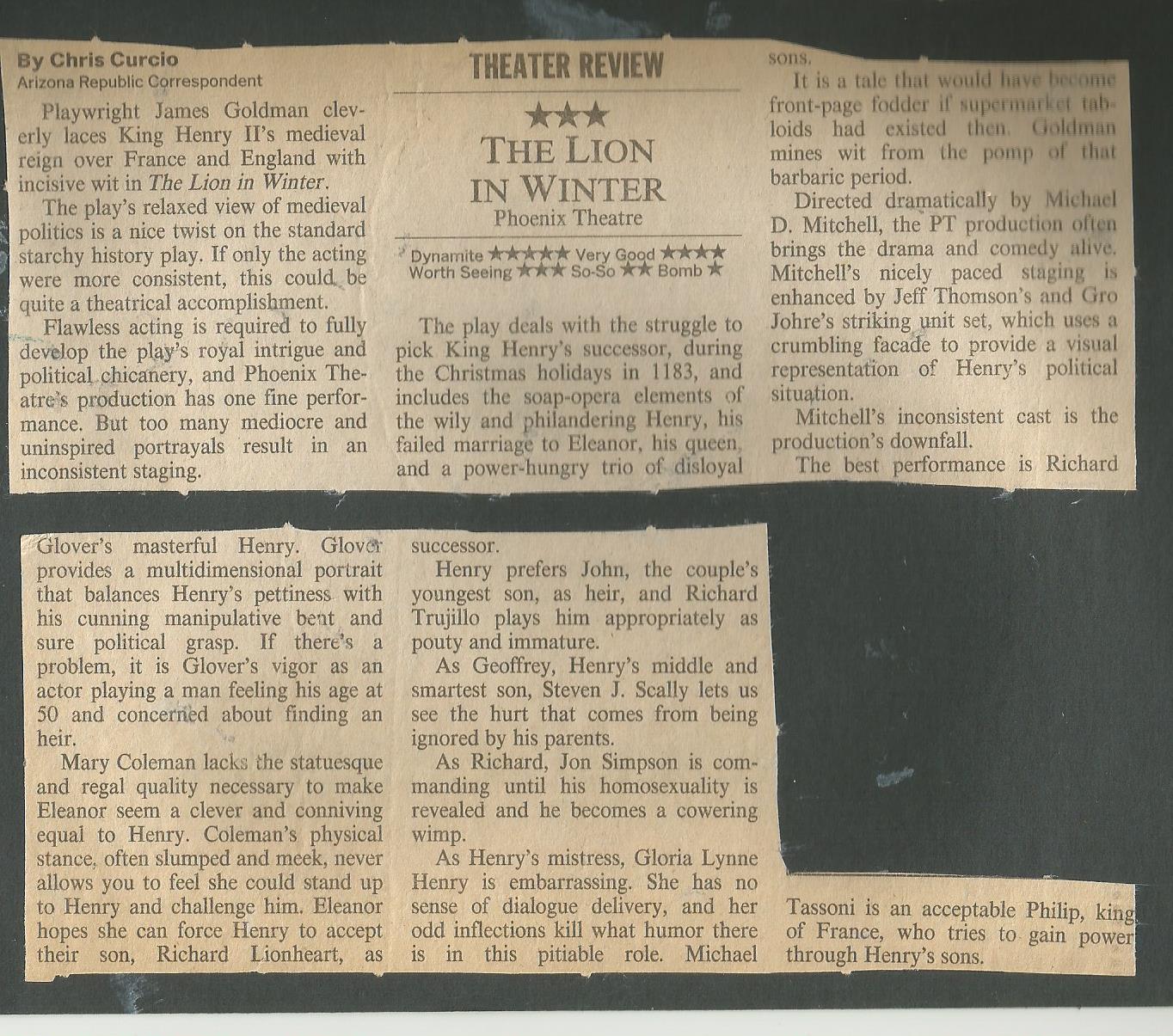Steven J. Scally is one of the most gifted actors and directors working in Phoenix during the 2000s.
PHOTOGRAPHS
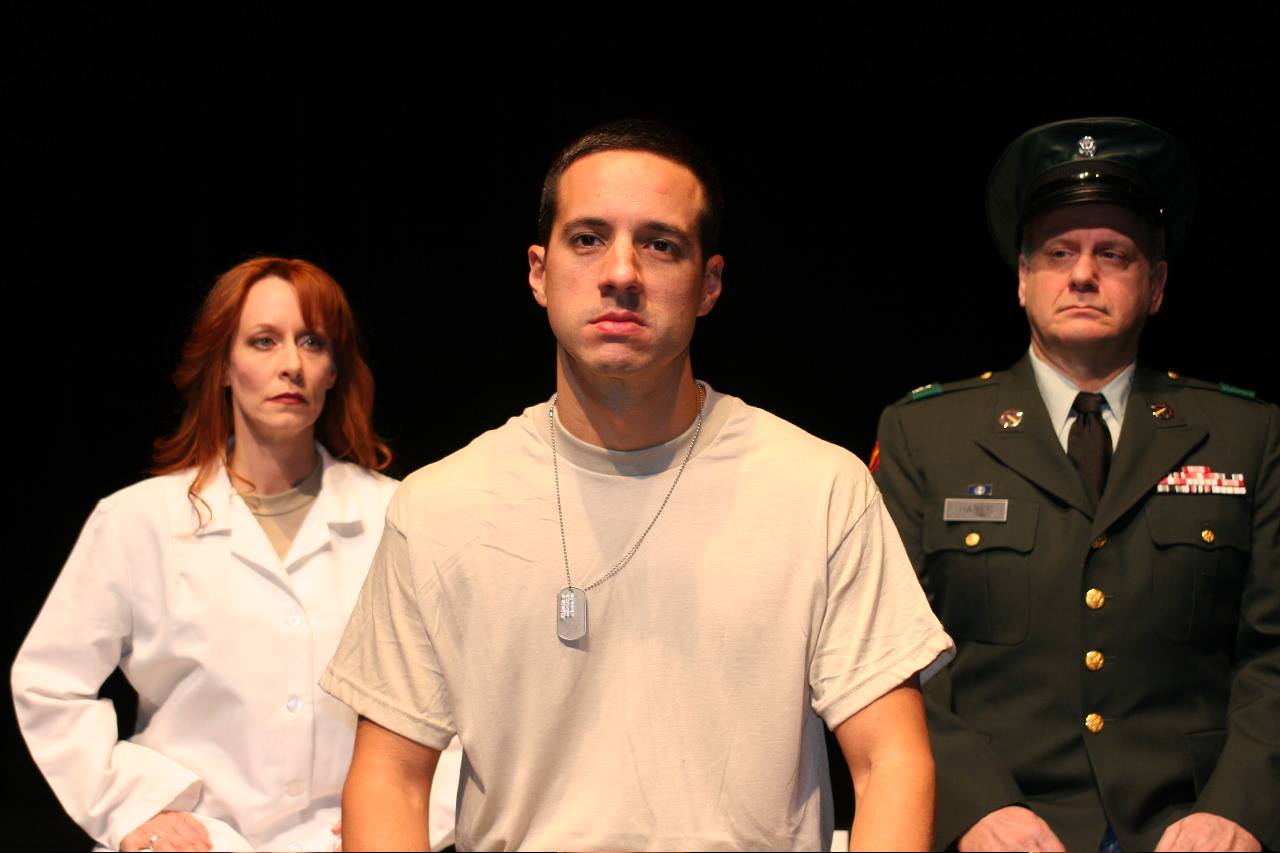
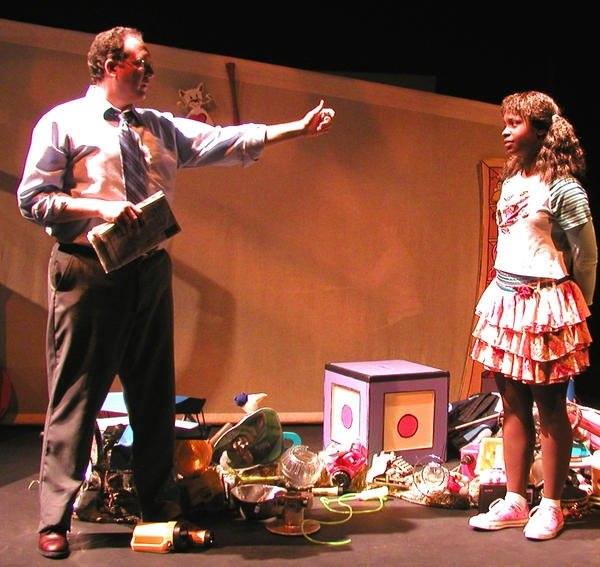
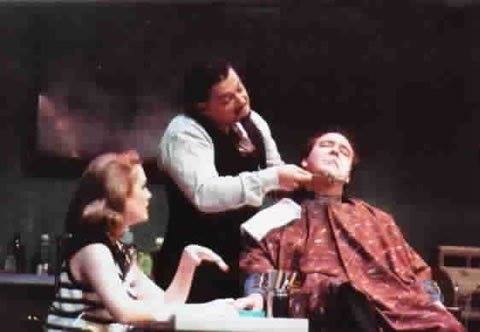
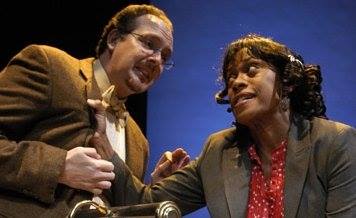
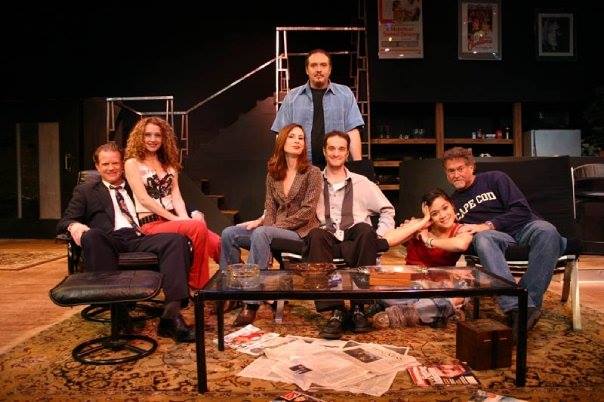
A BRIEF HISTORY OF ME by Steven J. Scally, March 2015
I was born in Detroit Michigan in 1967, but was raised in Petoskey Michigan up to the age of 10. When my parents divorced I chose to live with my mother, sister and grandmother and moved with them to Arizona. It was at Kino Jr. High where I took my first acting class after not making the school baseball team. I continued studying theater at Westwood High School until I graduated in 1985.
I spent the next three years in the U.S. Army as a Military Police Officer stationed in Frankfurt Germany, where I managed to continue doing theater. I was Honorably Discharged in 1988 and returned to Phoenix to go to school at Mesa Community College. From there, I was accepted at the American Academy of Dramatic Arts in New York City where I studied acting for a year.
When I returned to Arizona I still couldn’t stay settled. I tried returning to New York several times, and even tried t o live in San Diego for awhile. Yet I always found myself back in Arizona.
I have had the privilege of working with several theatre companies over the years. If I had to chose some favorite roles they would be: Geoffrey in ‘The Lion in Winter’, Alfred in ‘Little Murders’, Dr, Miranda in ‘Death and the Maiden’ and Dominic in ‘Indivisible’.
I have had the pleasure of Directing three times (Shadow Box, Gross Indecency and 9 Circles) and have been lucky enough to work in a couple of films, the most recent appearing opposite of Will Ferrell in ‘Everything Must Go’.
REVIEWS
Fledgling theater company deserves the spotlight. By Robrt L. Pela, Thursday, Jul 17 2003
If more part-time thespians approached their craft with the skill and imagination of Steven J. Scally, community theater would be a more cheerful place to visit. If Scally launched Awake and Sing Productions — which took its first bows last week with a revival of Michael Cristofer’s Pulitzer Prize-winning The Shadow Box — to prove his talents as an actor/director, he’s succeeded. And if this first production is an indication of this small company’s potential, I’ll be counting the days until its next program.
The Shadow Box is set in an experimental hospice wedged into an anonymous forest; there, we meet three patients, all of them dying of unnamed illnesses. In Cabin One, Joe (George Wall) is visited by his wife Maggie (Alison Ganssle) and teenaged son (Alexandro Castaneda), who doesn’t yet know his father is dying. That’s because Maggie refuses to admit that Joe won’t be coming home, won’t be surviving his illness. Next door, middle-aged Brian (Scally) is attempting to brighten his last hours with a new lover, Mark (Michael Arbuckle), and a visit from his zany ex-wife, Beverly (Toni Jourdan). She spends most of her time baiting the young man, a teetotaler and former prostitute, with booze and bitchy asides. And in Cabin Three, there’s senile, wheelchair-bound Felicity (Joyce Gittoes), who’s cared for by her long-suffering daughter, Agnes (April Smith), and who’s hanging on in hopes of a visit from Agnes’ sister.
Aside from a couple of speeches by Brian, Cristofer’s dialogue is sometimes sentimental and frankly difficult to sell. It’s lousy with metaphors, and hops quickly from tragedy to dark comedy — a construct that requires skillful direction and a strong cast. Scally finesses the story’s overlapping dialogue and quickly shifting vignettes, and most of his cast delivers worthy performances.
Steven J. Scally has put together a talented cast for his inaugural production.
Scally himself handles Brian’s comic speech about his newfound passion for work and life, in which the dying man lists his many recent mundane accomplishments, with a lighthearted melancholy. When he quickly shifts to a monologue about his fear of death — a mawkish speech that hollers for melodrama — Scally’s reading is as real as the tears glittering in his eyes. Scally even elevates a long, silly lecture about the time that mortals waste on trivialities.
Ganssle’s addled, perfectly pitched performance is all the more impressive because she plays each of her scenes with no assistance from Wall, who, as her husband, offers little more than line readings. And Joyce Gittoes once again proves that the stage is her home with a performance full of fiery anger and unscripted comedy.
It’s a tribute to Gittoes’ skill that she’s not entirely overshadowed by April Smith, an astonishingly talented actor whose performance here is a symphony of expertly drawn emotions. Of all the people trapped in this bleak forest, her Agnes is the most pitiable — sorry, sweet and doomed and, as played by Smith, fueled by angry passion. Smith’s tense, moving performance alone is worth the trip to see The Shadow Box, a solemnly entertaining evening of theater and — I hope — a promise of things to come from this fledgling company.
In Indivisible, Steven J. Scally, the Valley’s Most Underrated Actor, Shines By Robrt L. Pela Thursday, Mar 18 2010
It’s a pity there aren’t more play scripts like Taylor Doherty’s Indivisible. If there were, one might have the opportunity to watch Steven J. Scally perform in a fine drama more often.
Scally, perhaps the single most underrated actor in town, is captivating in Doherty’s excellent and vaguely futuristic commentary on American mores, now playing at iTheatre Collaborative. The actor literally bursts onto the stage, biting off Doherty’s brisk, brittle dialogue in a jangly Jersey accent. We meet him first as a benign and oafish clown, an extreme example of an archetypal working-class American male, lusting after babes and beer and braying invective at everything he doesn’t love. By the end of Act One, Scally’s Dominick has morphed into a genuinely terrifying monster — a tough transition to make in little more than an hour, but one that Scally handles expertly.
On paper, Indivisible sounds familiar, like a half-dozen other plays (and maybe one or two episodes of Alfred Hitchcock Presents) you’ve seen before: A group of strangers are held captive in a largely empty room; none of them remembers how or why they’re there. There’s Adam (Rolando Zee), a pacifist who’s given up on life; Gwen (Kristina Rogers), an archetypically angry activist who appears to hate men; and Dominick, who quickly becomes the group’s oppressive master. The prisoners learn that they’re subjects in a test program designed to rehabilitate people who’ve made “poor choices” in their lives, and quickly become a microcosm of society, squabbling over food and possessions and behaving badly. But Doherty avoids the typical high phoniness of this dated construct, replacing Cold War commentaries with observations on life in this country and more than a little high comedy.
The laughs come mostly from the series of absurdist video “lessons” hosted by George and Martha, a white-lab-coated pair who instruct the captives on the proper use of capitalism and faith and other tenets of what they call “the American way.” But this comedy is as dark as dried blood, rather a lot of which is shed in realistically gory sequences that literally splattered Christopher Haines’ sterile and beautifully lit set.
All this brutal to-ing and fro-ing is held tightly together by director Charles St. Clair, who finesses Doherty’s manic shifts between comedy and brutality into a gracefully lurid drama. That his cast manages to be seen at all alongside Scally’s dazzling performance is testimony to both their actorly skills and St. Clair’s stunning juxtaposition of fear, drama, and humor.
There are flaws. We never hear several of the characters’ stories, and are left to wonder why they’re trapped in the first place. The play is overlong and would benefit from some trimming, particularly to the video components, which are charmingly performed by Michael Traylor and Shannon Whirry. But Indivisible is still a more-than-worthy play, neatly written, tidily directed, and propelled by a spectacular performance by perhaps our most talented local actor.
Tinseltown Tirade
Hollywood and whine
BY ROBRT L. PELA
Robrt.Pela@newtimes.com
What are the chances that Nearly Naked Theatre will continue
to rack up winners with its string of subversive, complex
plays? I’ve watched as small companies have managed a
handful of hits with cute musicals and Neil Simon revivals,
and seen my share of avant-garde troupes wither and die
after a season or two of curious shows by radical writers. But
no company in the past decade has come anywhere near this
nearly unbeatable upstart. Nearly Naked consistently
surprises audiences with daring subject matter and excellent
productions. Even the company’s near-misses (The House of
Yes; Baylin’s Monster) have strutted with a confidence and
style that rival our local Equity houses. Where is Nearly
Naked finding these talented actors and directors? Why aren’t
these people also working at other small, avant-garde
playhouses?
Nearly Naked’s latest slam-dunk is David Rabe’s Hurlyburly,
which won the 1985 Tony Award for Best Drama. The 1998
film version, for which Rabe wrote the screenplay, won critical
praise but sank without a trace, and the superbly glib and
profoundly filthy play is seldom seen, in part because it’s so
long and because few theater groups are brave enough to
unleash Rabe’s misogynistic raging on its audiences.
Bent on proving how corrupt and self-indulgent Hollywood
really is, Hurlyburly drops us into the hectic, hedonistic home
of a pair of TV actor types who spend more time doing lines
than they do learning lines; more time abusing women and
every moral standard than they do making television deals.
There’s very little story here; Rabe’s dark-hearted comedy,
set sometime in the 1980s, is essentially a three-hour series
of rants and arguments bellowed by the most despicable men
you’d ever want to meet. But oh, what bellowing, as realized
by Steven J. Scally in a magnificently scary performance, and
Christian Miller, who carries the show as Eddie, a profoundly
disturbed scoundrel whose endless drug- and booze-fueled
raving about women (why can’t they be more like men?) and
his friends (why are they all such losers?) might have grown
tiresome if hollered by a lesser actor. But Miller’s motormouthed,
exasperated delivery and crazed pacing exude
desperation and ire. And I’m anticipating nightmares in which
I am thrown from my car by Scally, so forceful was his
performance as philandering Phil, the meanest psycho in
Tinseltown. These two are well supported by Scott Dillon as
Eddie’s sleazy roommate, and Kerry McCue as his girlfriend;
unfortunately, the other players don’t get anywhere near
Miller’s and Scally’s powerful performances.
Hurlyburly isn’t directed, it’s choreographed, and April Smith’s graceful manipulation of these lost, frantic people — who cover nearly every inch of Alicia Marie Turvin’s magnificent set with their frenzied, drug-induced pacing — captures the caged desperation of Rabe’s crazed characters. Smith knows that the women of Hurlyburly are accomplices in their own abuse and, more important, that a three-hour play in which fucked-up men torment one another can also be an entertaining evening of theater.
Glengarry Glen Ross. Mamet’s play falls flat at the Space Theatre. By Robrt L. Pela. Thursday, Jun 17 2004
David Mamet’s love of the rhythms of American speech is the hallmark of his work. His people speak in a repetitive, rat-a-tat cadence, always overlapping and usually taking two conversational steps backward for each step forward. Mamet’s is a language filled with expletives — there are reportedly more than a hundred uses of the word “fuck” in Mamet’s Glengarry Glen Ross, currently stuttering its way across the Theatrescape stage — a language that’s deeply emotional and dark and uniquely Mamet’s own.
It’s this inimitable use of language that makes a Mamet play a wonderful thing, and also the very thing that can annihilate it. Because Mamet’s words are meant to mock the natural rhythm of speech, and because they’re so very difficult to read properly, a lesser performer can make mincemeat of the playwright’s long, teetering dialogues. Handled by such a performer, Mamet’s characters begin to sound like, well, David Mamet characters.
Which is the sad case with Theatrescape’s Glengarry Glen Ross, a more-than-slightly off-kilter reading of an inarguably difficult play. Because Glengarry Glen Ross — indeed, most all of Mamet’s plays and films — is about the way that people talk to one another, and because only a few of director Christopher Mascarelli’s cast members are up to the challenge of re-creating Mamet’s oddball dialogue.
The Glengarry Glen Ross cast wants to sell you some Mamet.
Steven J. Scally plays a mercurial middle-management loafer who’s playing baby sitter to three struggling Chicago real estate agents, all employed at the same office and at different stages of their careers. There’s Shelly “The Machine” Levene (Marty Berger), a former hotshot who, in his dotage, is reduced to groveling for third-rate listings. And Dave Moss (Scott Dillon), a big deal in small-time property sales whose criminal mind is fueled by his outsize ego. George Aaranow (Bruce Halperin) is a panicky patsy who may or may not be behind the burglary that Act Two is built around. And then there’s Richard Roma, an unctuous peddler of property who’ll say anything to anyone to get him to sign on the dotted line. He’s the Count Dracula of closing costs, a dark cartoon of manhood whose opening monologue is an amazingly long-winded cogitation on morals and the meaning of life and the smell of a train compartment that goes everywhere and no place at all and that, as read by John Sankovich, is the best thing about this production.
Despite the best efforts of the supporting players, only Sankovich and Scally are up to the challenge of Mamet’s headlong rush of words. Sankovich is a storm of hardy histrionics, wagging his elegantly arched eyebrows and spewing Mamet’s familiar stylistic tics (repetitions, interruptions, the quizzical ellipsis after every statement) like a villainous choirmaster. If Sankovich is a storm, then Scally — at least until his amazing eruption in Act Two — is the eye of that storm, calmly conveying a deep disdain for the men who surround him.
Cleverly directed by Christopher Mascarelli, the program benefits from the closed, cramped quarters of the tiny Space Theatre. Ultimately, though, the limited talents of the supporting players leave us more agitated by what we see than involved in it. Thus, Mamet’s cautionary tale of the power of money and the weakness of men is merely unnerving, and only sometimes entertaining.
RESUME
S.A.G. – AEA (candidate)
Height: 6”1 Weight: 230
Hair: Brown Eyes: Hazel
FILM:
Everything Must Go Fisherman EMG, LLC Dan Rush
Malevolent Solace Alvin Solace David Cano
John: Hit-man Luke Scene/Scene Pictures Travis J. L. Padour
Lights Over Phoenix Witness Xaura Films Daniel Pace
Neon Empire Crowd Extra Fries Entertainment Larry Peerce
Highway to Hell Dead Cop Hemdale Film Corp. Ate de Jong
Theatre:
* Indivisible Dominic iTheatre Collaborative
* Fathers and Other Strangers Davis Black Theatre Troup
* A Bad Friend Morty iTheatre Collaborative
* Bug Goss iTheatre Collaborative
* Kindertransport All Men AZ Jewish Theatre
* Fabulation: Or the Re-education of Undine Robert/Ensemble Black Theatre TroupE
* August in April Sturdyvant iTheatre Collaborative
* Oscar & Felix Vinnie AZ Jewish Theatre
* Death & the Maiden Dr. Miranda iTheatre Collaborative
* Hurlyburly Phil Nearly Naked Theatre
* Interrupting Vanessa Dad Childsplay, Inc.
* Poona the Fuckdog Storyteller/Mr. Beer Straycat Theatre
* Glengarry Glen Ross Williamson Theatrescape
+Bee-Luther Hatchee Robert/Interviewer iTheatre Collaborative
* The Shadow Box Brian Awake & Sing Prod.
* King Levine Pizza Man AZ Jewish Theatre
* The Beauty Machine Steven/Mayor Childsplay, Inc.
* Awake & Sing! Schlosser AZ Jewish Theatre
* Richard III (x2) Buckingham The Shakespeare Theatre
* The Last Wallace & Ladmo Show Stan/Drummer TheatreWorks
* King Lear Duke of Albany The Shakespeare Theatre
* All-Male Review Steve Blackball Ensemble
* The Comedy of Errors Merchant Phoenix Theatre
* Death Defying Acts Sam Algonquin Theatre
* The Wallace & Ladmo Show Troy/Wheel/Monster/Sgt. Harry Super Boffo Prod.
* The Gift Horse Dorfknocker AZ Jewish Theatre
* The Taming of the Shrew Baptista The Shakespeare Theatre
* Before it Hits Home Douglas Black Theatre Troupe
* The Mousetrap Det. Sgt. Trotter Desert Foothills
* Othello Duke/Lodovico SunFire Theatre
* Bottom Desk Drawer David Playwrights Theatre
* A Streetcar Named Desire Doctor Phoenix Theatre
* The Wedding Present Brad Playwrights Theatre
* Magic Time Lawrence SunFire Theatre
* Little Murders Alfred In-Mixed Company
* A Raisin in the Sun Lindner Black Theatre Troup
* The Lion in Winter Geoffrey Phoenix Theatre
* Howard’s Last Stand Howard ATOP Brown Bag
* God’s Favorite David Tempe Little Theatre
* Jeckyll & Hyde Utterson SRO Theatre Troup
* Crimes of the Heart Barnette Frankfurt Playhouse
* Brighton Beach Memoirs Stanley Frankfurt Playhouse
* Amadeus Joseph Frankfurt Playhouse
Training:
The American Academy of Dramatic Arts (NYC)
Awards:
AriZonie Award Best Actor for ‘Little Murders’
AzCTF Award Best Actor for ‘A Few Good Men’
Irene Ryan Nominee for ‘A Few Good Men’ & ‘Brighton Beach Memoirs’
Special Skills:
Military Police; Percussionist; Fencer (competition & stage); Dialects (on request)
